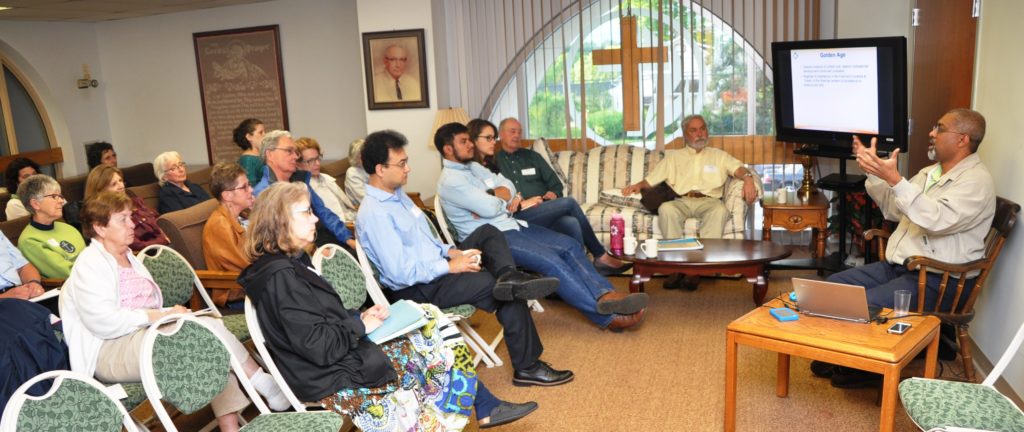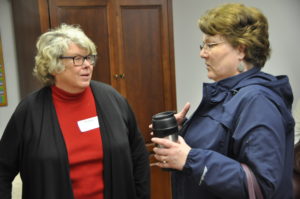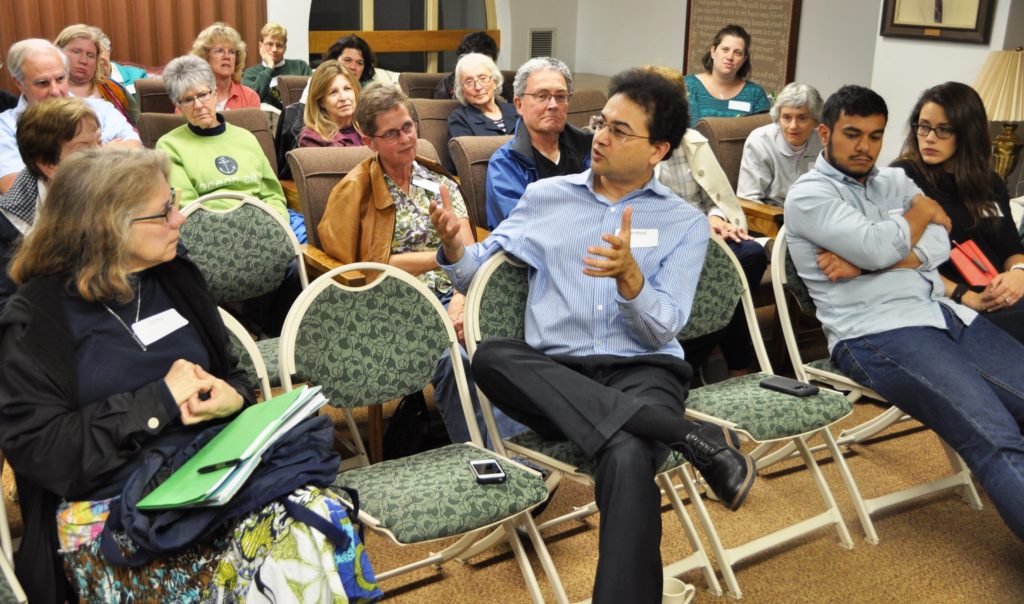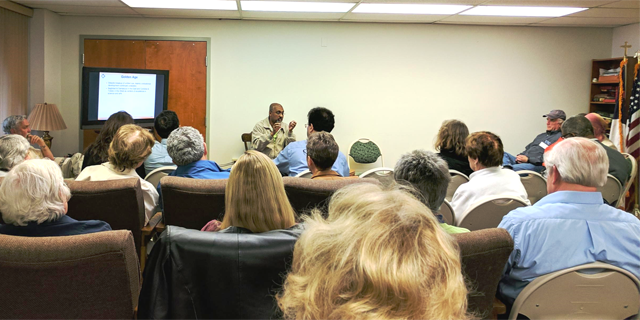
That which is, is far off, and deep, very deep; who can find it out? I turned my mind to know and to search out and to seek wisdom and the sum of things… Ecclesiastes 7:24-25a (NRSV)
Grove UMC in West Chester, Pa., offers an Adult Forum on Sundays that reaches beyond the usual Bible study and Sunday school to serve inquiring minds who seek to understand “the sum of things.” Indeed, the church went deeper in that quest this year by examining a topic that may seem “far off” but is very close to home: the history, faith and culture of Muslim people.
Grove recently completed a 10-week Sunday night lecture and discussion series that it first offered a decade ago and will offer again this fall, titled “An Introduction to Islam and Muslims through History and Scripture.” Weekly audiences, gathered in an upper room of the church, averaged about 40 people of various faiths (Protestant, Catholic, Jewish, Muslim and Quaker), among the 67 who initially signed up. The popular series ran from February to May.
The church first offered the series in 2007 and 2009. But the divisive 2016 U.S. Presidential election and growing opposition toward Muslim people, especially immigrants, prompted the need for an encore.
Two longtime Grove members, Arlene Rengert and Donna Pyne, led coordination and promotion of the well-received, 10-session interactive learning experience. Now, it’s coming back by popular demand, beginning September 17, again at no cost. (To register, send Rengert your home address, phone number, email address and indicate your faith background and/or church membership.)
Islam is a major, ancient, global religion that has long been a part of American life and culture, especially since the mid-19th century. Today we have one of the most ethnically diverse Muslim populations in the world, counted in a 2010 study as nearly 1% of the U.S. population, behind Christianity (70.6%) and Judaism (22.8%).
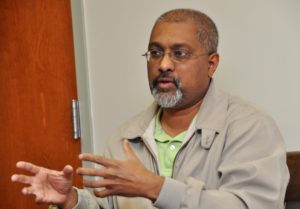 Many American Christians recognize the importance of learning about Muslim faith and culture; but that recognition is not as widespread as it should be. Iftekhar Hussain (right), a Muslim U.S. citizen and business consultant born in Bangladesh, and Chairman of the Council on American-Islamic Relations (CAIR) in Pennsylvania, has worked for 15 years to expand awareness among willing learners. Also a member of the Philadelphia CAIR’s executive committee, he teaches in churches, synagogues, mosques, schools and other settings throughout our region, always offering his knowledge and insight at no cost.
Many American Christians recognize the importance of learning about Muslim faith and culture; but that recognition is not as widespread as it should be. Iftekhar Hussain (right), a Muslim U.S. citizen and business consultant born in Bangladesh, and Chairman of the Council on American-Islamic Relations (CAIR) in Pennsylvania, has worked for 15 years to expand awareness among willing learners. Also a member of the Philadelphia CAIR’s executive committee, he teaches in churches, synagogues, mosques, schools and other settings throughout our region, always offering his knowledge and insight at no cost.
With a comfortable, genial style, but well-informed and impassioned at times, Hussain lectures with colorful Powerpoint slides and invites questions and discussion about the historical, philosophical and scriptural perspectives of his faith. He covers religious, political, cultural, economic and relational truths of past and present Muslim societies, including gender politics, the ascent and decline of “The Golden Age” of Muslim civilization, reform movements and U.S. foreign policy and engagement with predominantly Muslim nations.
Jesus in the Qur’an
The lectures and discourse are mind-expanding, even life-altering for some. Session three draws special interest to its focus on “Jesus in the Qur’an.” Islam’s sacred text teaches about the angel Gabriel’s visit to Mary under a palm tree, the immaculate conception and birth of Jesus, and his role as a sacrificial savior of his people who is prophesied to return.
Hussain also offers candid criticism of: the medieval Roman Catholic Crusades; ISIS as a political, not a religious, movement that resulted from the U.S. invasion of Iraq; and the sins and errors of U.S. foreign policy in the Middle East.
“But as a religious person,” he told his students at the end of his final lecture on May 7, “I believe God requires us to be optimistic. It’s all a test from God. Moral beings must rise to the test, the challenge to eschew the worst in us and embrace the best in us.”
Lucy Gubbins and her companion Mohammad “Mo” Mukhtar are trying to rise to that test. They drove to the lectures each Sunday night from Collingswood, N.J. “The day after the election I was searching online for a place to learn and respond to the anti-immigrant fervor I saw happening,” said Gubbins, a self-described “seeker” who was raised Episcopalian.
Deeper understanding of Muslim spirituality
“I found information on the Interfaith Council of Philadelphia website about CAIR and learned about these lectures. This has been life-changing for us. I felt well-read about the basics of Islam; but I realized here that my knowledge was superficial. Now I have a deeper understanding of Muslim spirituality, and it helped me explore my own faith.
Mary Beth O’Donnell, a “practicing Catholic,” learned about the series from neighbors who are Grove members. She attended the last three sessions because her daughter’s recent engagement to a Muslim man made her want to learn more about his faith. “I began reading on my own… but I wish I had come to hear all the lectures.”
Another Catholic, Terry Houle, said, “My husband and I learned how much we do not know. We were mesmerized by Iftekhar’s passion and knowledge and will never forget this experience. We did not want to see it end.”
Alfred Wright, one of several attendees from Hopewell UMC, recognized a need for more interreligious learning at his church. “I have very limited knowledge of the Islamic religion and culture,” he said, “but, given the way the world is today, that is a real handicap. It is important that people of various faiths and traditions get together and interact as much as possible.”
Rengert agrees fully. She has helped other congregations of various faiths to hold similar encounters. “We all need to go out and tell people about this opportunity,” she said. “I had my greatest exposure to Islam in this class, even to learn about Jesus in the Qur’an.
Hussain, a husband and father of three, took two years off from lecturing to help his two oldest children prepare for college. But now he is back and eager to teach whosoever will come. “These events can seed others,” he said, “if people who attend will go back and organize more opportunities in their churches or communities.”
Additional photos by John Coleman

